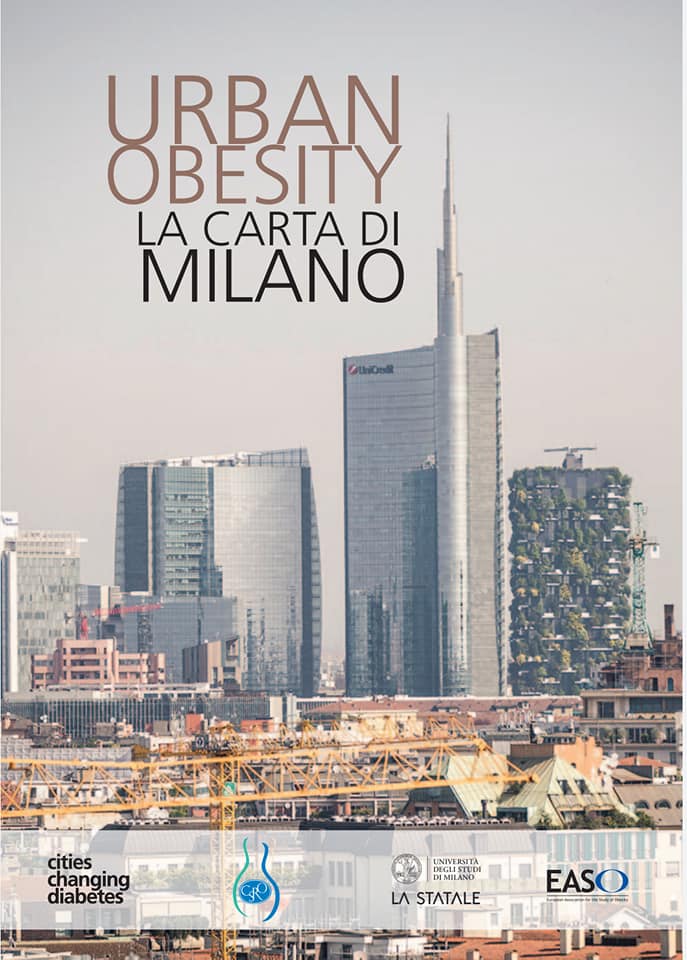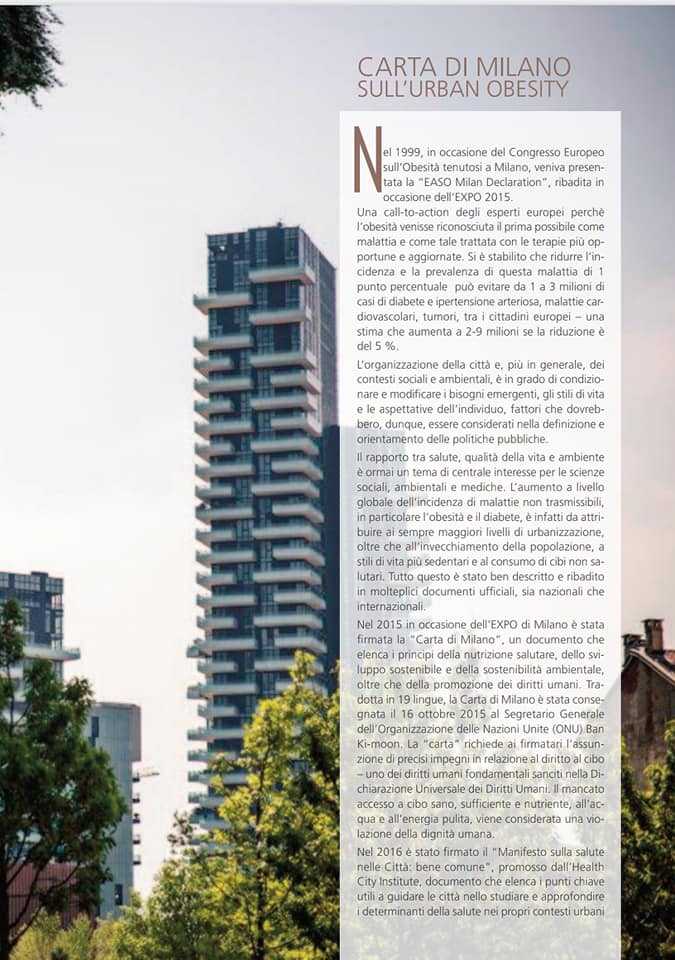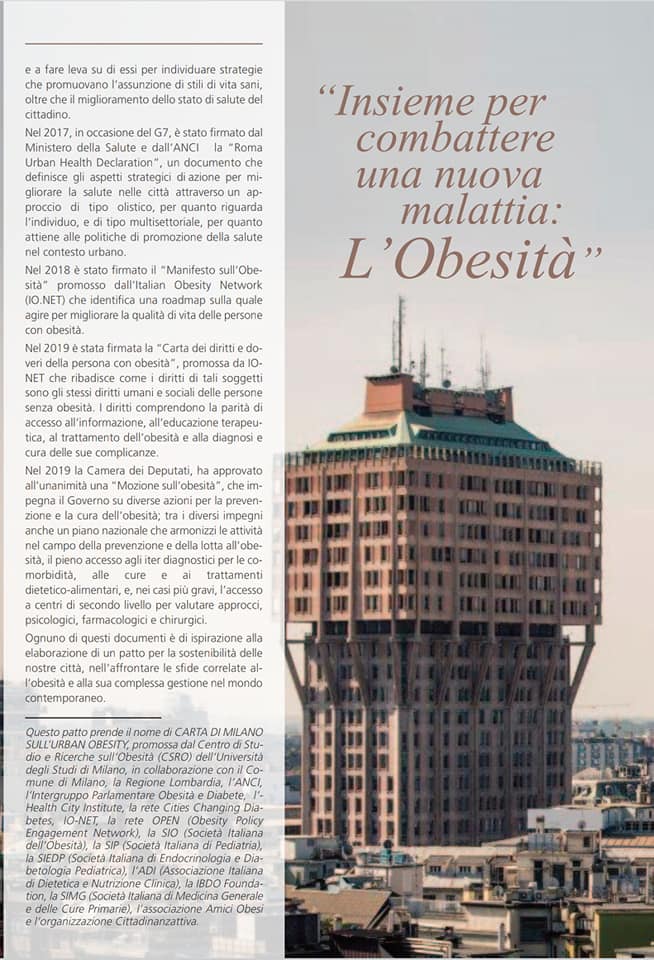Congratulations to our colleagues in Italy Amici Obesi Onlus on their excellent collaboration in the ‘Milan charter on urban Obesity’. We are proud of all you continue to achieve for people living with Obesity! In particular our colleagues Iris Zani, Diana Castillo & Cristina Rastelli.
OBESITY: Milan Charter on Urban Obesity signed
MAY 18, 2020
A pact between administrators, experts and citizens, promoted by the CSRO-Center of Studio and Research on State obesity, for access to care, prevention and fight against social stigma.

The Charter of Milan
“A fair and sustainable future for people with obesity is also our responsibility “. The ” Carta di Milano on Urban Obesity” ends with these words, a pact between administrators, doctors, experts and citizens, with which to hire Precise commitments on how to synergically address obesity as a disease, ensuring a better quality of life for people with obesity living in large urban centres.
The document, presented today during a videoconferencing is promoted by the #CentrodioeRicerchesullObesity (CSRO) Università degli Studi di Milano, in collaboration with the Comune di Milano, Regione Lombardia, Anci, #Intergroup ParlamentareObesitàeDiabetes, #HealthCityInstitute , the #CitiesChanginDiabetes network, #IONET, the #OPEN (Obesity Policy Engagement Network) network, EASOobesity (European Association for the Study of Obesity) SIO Società Italiana dell’obesità, the Società Italiana di Pediatria, the SIEDP Società Italiana di Endocrinologia e Diabetologia Pediatrica ), ADI-Associazione Italiana di Dietetica e Nutrizione Clinica, #IBDOFOUNDATION, the SIMG-Società Italiana di Medicina Generale, the National Association Amici Obesi Onlus and the organization Cittadinanzattiva.
“Milan’s Charter on Urban Obesity – recalls Michele Carruba, President Center of Studio and Research on Obesity of the State University of Milan – originates from a historic document signed in Milan in 1999 by all the European scientific societies that dealt with research on obesity. It was called “EASO Milan Declaration”, the first call-to-action by experts for obesity to be recognized as disease and as such treated with the most appropriate and updated therapies. This was followed, during EXPO 2015 in Milan, the “Carta di Milano”, which lists the principles of healthy nutrition, sustainable development and environmental sustainability, which expanded action goals in the light of major changes that Humanity’s lifestyle was facing, such as growing urbanization and urbanization.”

“Already over twenty years ago the international scientific community underlined the danger to health, resulting from a condition that at the time, the vast majority considered a predominantly aesthetic problem – Luca Busetto, co-chair Obesity Management Task Force of EASO ( European Association for the Study of Obesity). Instead, reducing obesity prevalence by 1 percentage point can avoid from 1 to 3 million cases of diabetes, arterial hypertension, cardiovascular diseases and cancer among European citizens; an estimate increases to 2-9 millions if the reduction is 5 %. We are talking about a disease that affects 20 % of males and females in Europe respectively, which causes 337 thousand deaths each year and costs EUR 70 billion in the old continent, which finally could reach the dramatic threshold of 50 % of the European population by 2030”.
To raise awareness of society and especially the Italian political world to deal with the obesity phenomenon in our country, in 2018 the Italian Obesity Network (IO). NET) promoted the ” Obesity Manifesto “, which identifies a roadmap on which to act to improve the quality of life of people with obesity and, the following year, the “Charter of Rights and duties of the person with obesity”, which reaffirms how the rights of people with obesity are the same rights as everyone, including equal access to information, therapeutic education, treatment of obesity and diagnosis and care of its complications.

“These were important initiatives – comments Giuseppe Fatati, President IO-NET – in the long journey started with Milan Declaration, to guarantee the best assistance to over 5 million Italians with obesity, corresponding to about 10 % of the population-9,4 % women and 11,8 % men – and to whom around 800 children are added. A path, which has seen one of its milestones in the approval by the Chamber of Deputies, again in 2019, of a “Motion on obesity”, which commits government on several actions to prevent and care of the sickness”.
The Motion approved by the Chamber includes, among the various commitments, that of a national plan harmonizing activities in the field of prevention and combating obesity, full access to diagnostic processes for comorbidity, treatment and diet-food treatments, and, in the most serious cases, access to level two centres to evaluate psychological, pharmacological and surgical approaches. ” Each of the stages that has been retraced so far inspired the development of a pact to address the challenges related to obesity and its complex management in the contemporary world, combined with sustainability for our cities – explains Andrea Lenzi, Open Coordinator (Obesity Policy Engagement Network) Italy. In fact, we now know for sure what cities are in increasing the incidence of non-communicable diseases globally, particularly obesity and diabetes, due to more sedentary lifestyles and consumption of unhealthy foods, but also how much the particular organization of the city and, more generally, of social and environmental contexts, is able to affect and modify the lifestyles and expectations of the individual, if appropriately considered in the orientation and shaping of public policies.”

This is inspired by the Milan Charter on Urban Obesity. “All those who – people or institutions – have signed, and we hope to sign this pact in the future – concludes Enzo Nisoli, Director Centro di Studio and Research on Obesity of the University of Milan – will undertake to contribute to joint efforts to make the environment and urban fabric less obesogenic and oriented to the quality of life of subjects with obesity, through the elimination of those social, architectural, structural and cultural barriers that prevent them from a normal life of fact. We believe that only the synergistic work of many figures can create truly innovative and creative efforts that start processes capable of winning the great challenges related to obesity, such as access to care and combating social stigma, particularly relevant in high contexts Socio-demographic impact and large urban and metropolitan areas “
OBESITÀ: SOTTOSCRITTA LA CARTA DI MILANO SULL’URBAN OBESITY
18 MAGGIO 2020.
«Un futuro giusto e sostenibile per le persone con obesità è anche una nostra responsabilità.»
Si conclude con queste parole la “Carta di Milano sull’Urban Obesity”, un patto tra amministratori, medici, esperti e cittadini, con il quale assumere impegni precisi su come affrontare in maniera sinergica l’obesità come malattia, garantendo una migliore qualità di vita delle persone con obesità che vivono nei grandi centri urbani.
La Carta sollecita decisioni politiche, che garantiscano il raggiungimento dell’obiettivo fondamentale di un equo accesso alle cure, di avviare progetti di prevenzione primaria, di rendere le nostre città ambienti più salutari e meno obesogeni, e di far fronte allo stigma sociale che ancora pesa su questa malattia.
In Europa, 1 cittadino su 5 è obeso e le stime convergono verso la drammatica soglia del 50% al 2030; in Italia le persone adulte obese sono oltre 5 milioni cui si aggiungono circa 800 mila bambini.
Il documento, presentato oggi nel corso di una videoconferenza è promosso dal #CentrodiStudioeRicerchesullObesità (CSRO) Università degli Studi di Milano, in collaborazione con il Comune di Milano , la Regione Lombardia, Anci, #lntergruppoParlamentareObesitàeDiabete, #HealthCityInstitute, la rete #CitiesChanginDiabetes, #IONET, la rete #OPEN (Obesity Policy Engagement Network), EASOobesity ( European Association for the Study of Obesity) ADI – Associazione Italiana di Dietetica e Nutrizione Clinica , la Società Italiana di Pediatria, la SIEDP Società Italiana di Endocrinologia e Diabetologia Pediatrica, SIO Società Italiana dell’obesità , #IBDOFOUNDATION, la SIMG – SIMG – Società Italiana di Medicina Generale , l’Associazione Nazionale Amici Obesi Onlus e l’organizzazione Cittadinanzattiva.
